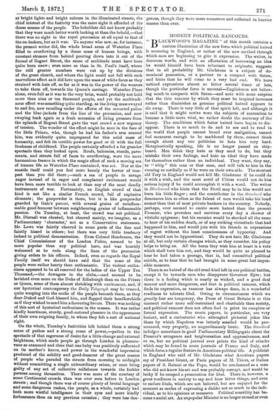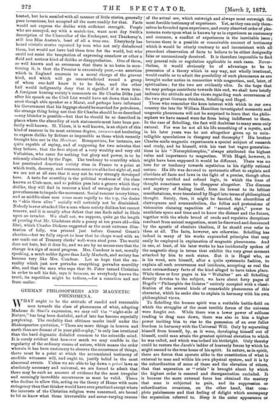MODERNPOLITICAL RANCOURS.
"BLACKWOOD'S MAGAZINE" of this month contains a curious illustration of the new form which political hatred is assuming in England, or rather of the new method through which men are beginning to give it expression. The writer, in decorous words, and with an affectation of borrowing an idea he would himself have been reluctant to originate, suggests that in all probability Mr. Gladstone is a subject of de- moniacal possession, or a partner to a compact with Satan, and hints that he will come to a very bad end. We have noticed expressions almost as bitter several times of late, though the particular form is unusual—Englishmen not believ- ing much in compacts with Satan—and note with some surprise that the thin rancour by which they must be inspired increases rather than diminishes as genuine political hatred appears to die away. There is very little of that spirit left, and although it is said that it might revive were the subjects of contention to become a little more vital, we rather doubt the accuracy of the theory. The conditions which foster hatred have begun to dis- appear. There is so much to do and to see and to read in the world that people cannot brood over malignitiea, cannot feel measures enough to be maddened by them, cannot think enough about any one politician to hate him very hard. Metaphorically speaking, life is no longer passed on ship- board. Men think they hate as they used to do, but they mistake their own feelings, and hate an ideal they have made for themselves rather than an individual. They want, they say, to " whip " this man or that man, and will talk to him in the evening as cordially as if he were on their own side. The stoutest old Tory in England would not kill Mr. Gladstone if he could do it with a wish, and the most acrid of Ultras would not do him serious injury if he could accomplish it with a word. The writer in Blackwood who hints that the Devil may be in him would not burn his little finger ; and the contributor in the Standard who denounces him so often as the falsest of men would take his bond sooner than that of most private bankers in the country. Nobody, perhaps, ever seemed to excite more hatred than the present Premier, who provokes and survives every day a shower of vitriolic epigrams ; but his enemies would be shocked all the same to hear of his sudden death, or of any striking vicissitude that had happened to him, and would join with his friends in expressions of regret without the least consciousness of hypocrisy. And they would not be hypocritical. They do not hate Mr. Gladstone at all, but only certain changes which, as they consider, his policy helps to bring on. All the harm they wish him at heart is a vote which shall turn him out, and they would be quite as pleased to hear he had taken a peerage, that is, had committed political suicide, as to hear that he had brought in some great but impos- sible measure.
There is no hatred of the old cruel kind left in our political battles, except it be towards men who disapprove Governor Eyre ; but there is a feeling which is nearly as wicked, and a good deal meaner and more dangerous, and that is political rancour, which finds its expression, as rancour has always done, in a wonderful readiness to tolerate libel. Owing to circumstances which we greatly fear are temporary, the Press of Great Britain is at this moment rather more self-restrained and charitable than society, and political rancour does not often find in print its complete or formal expression. The comic papers, in particular, are very
lenient, and a caricaturist who attempted pictorial jokes like those by which Napoleon was latterly assailed would be pro- nounced, very properly, an ungentlemanly brute. The Standard
indulges sometimes in good Parliamentary Billingsgate about the Premier's arrogance and tergiversation and oppressiveness, and so on, but no political journal ever prints the kind of attacks which may be found in some journals of France and Italy, and which form a regular feature in American political life. A publicist
in England who said of Mr. Gladstone what American papers say of President Grant, or Paris papers of M. Thiers, or Italian papers of S. Ratazzi or the Pope, would be condemned as a man who did not know his art and was probably corrupt, and would be lucky if he escaped a prosecution for libel. There is, however, a .
great readiness in society to say and hear bitter things, and even to endure libels, which are not believed, but are enjoyed for the
moment as modes of expressing a dislike not so much to the Indi- vidual, as to his opinions or measures. Political scurrility has be- come a social art. An unpopular Minister is no longer stoned or even



































 Previous page
Previous page